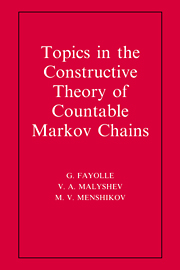Introduction and history
Published online by Cambridge University Press: 05 November 2011
Summary
Introduction
This book differs essentially from the existing monographs on countable Markov chains. It intends to be, on the one hand, much more constructive than books similar to, for example Chung's [Chu67] and, on the other hand, much less constructive than some elementary monographs on queueing theory, where the emphasis is mainly put on the derivation of explicit expressions. The method of generating functions, which is to be sure the most constructive approach, is not included, since the dimension of the problems it can solve is small (in general ≤ 2). Our book could equally be called Constructive use of Lyapounov functions method. Here the term constructive is taken in the sense close to the one widely accepted in constructive mathematical physics. One can say that the objects considered have a sufficiently rich structure to be concrete, although the results may not always be explicit enough, as commonly understood. Semantically, it is permissible to say that our methods are more qualitative constructive than quantitative constructive.
The main goal of the book is to provide methods allowing a complete classification (necessary and sufficient conditions) or, in other words, allowing us to say when a Markov chain is ergodic, null recurrent or transient. Moreover, it turns out that, without doing much additional work, it is possible to study the stability (continuity or even analyticity) with respect to parameters, the rate of convergence to equilibrium, …, etc. by using the same Lyapounov functions.
Information
- Type
- Chapter
- Information
- Publisher: Cambridge University PressPrint publication year: 1995
